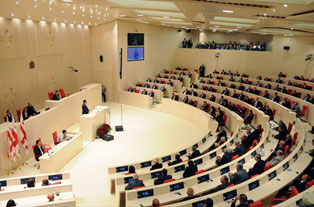Civil georgia
Parliament failed on June 12 to elect six non-judge members of the High Council of Justice after none of the 29 candidates garnered two-third majority of votes in secret ballot.
Such an outcome became inevitable after UNM parliamentary minority group said it would not take part in voting, citing GD’s refusal to engage in last-minute consultations on selecting those candidates who could have enjoyed bipartisan support. Although GD controls majority seats in the Parliament it falls short of two-third majority – 100 votes.
Parliamentary Chairman Davit Usupashvili said that consultations between the factions had already been carried out and no additional talks ahead of the vote were required as it would have hardly produced any agreement. He instead offered to hold consultations ahead of the second round.
Conference of Judges, a self-governing body of the judiciary, elected from within its ranks seven judge members of the High Council of Justice (HCoJ), the body overseeing judiciary.
Six seats in the HCoJ should be filled by non-judge members elected by the Parliament from candidates nominated by legal advocacy NGOs, Georgian Bar Association and law schools and faculties of the high education institutions.
These six members should be confirmed by the Parliament with two-thirds majority; in practice it means that votes of UNM parliamentary minority lawmakers would also be required. But in order to avoid a deadlock, holding of second round of voting is envisaged in case in the first round candidates fail to garner support of the two-third of parliamentarians; a simple majority – that is 76 votes – will be enough for a candidate to be confirmed as HCoJ member in the second round.
No anti-deadlock measure, however, applies to two out of six seats, meaning that two candidates should definitely be confirmed with two-thirds majority; it means that two seats in the HCoJ will remain vacant as long as the Parliament fails to select a candidate enjoying support of at least 100 parliamentarians; in practice it means that these two seats will only be filled if candidates are supported by UNM lawmakers.
Total of 44 would-be candidates’ applications were filed with the Parliament; 35 of them were selected by a special commission, but six of them withdrew their candidacy and as a result there were total of 29 candidates standing for election in HCoJ.
12 candidates, who garnered more votes than others and went into second round are: Gocha Mamulashvili, nominated by the Caucasus University, who garnered 90 votes against 1; Nino Bakakuri, nominated by the Georgian Young Lawyers’ Association and Free University (88 votes with none against); Vakhtang Tordia, nominated by Social Programs Foundation (88-2 vote); Eva Gotsiridze, nominated by the Georgian Patriarchate’s University of St. Andrew the First-Called (87-1 vote); Ekaterine Gasitashvili, nominated by the Georgian Bar Association (86-2 vote); Kakhaber Sopromadze, nominated by the Association for Free Development and Rights Protection (85-11 vote); Levan Khetsuriani, nominated by the Georgian Technical University (70-2 vote); Mamuka Songulashvili, nominated by the Georgian Technical University (58-12 vote); Gia Meparishvili, who was prosecutor general in 2001, nominated by the Caucasus International University (46-18 vote); Madi Chantladze, nominated by the Center for Protection of Constitutional Rights (43-3 vote); Roin Migriauli, nominated by the Georgian Lawyers for independent Profession (38-11 vote); Davit Sulakvelidze, nominated by the Free University (34-7 votes).
The Parliament will hold second round of voting on Friday.
News
December 13, 2023
Ethnic minorities outside the peace dialogue
November 6, 2023
‘Peace’ agenda of political parties
Popular
Articles
February 13, 2024




